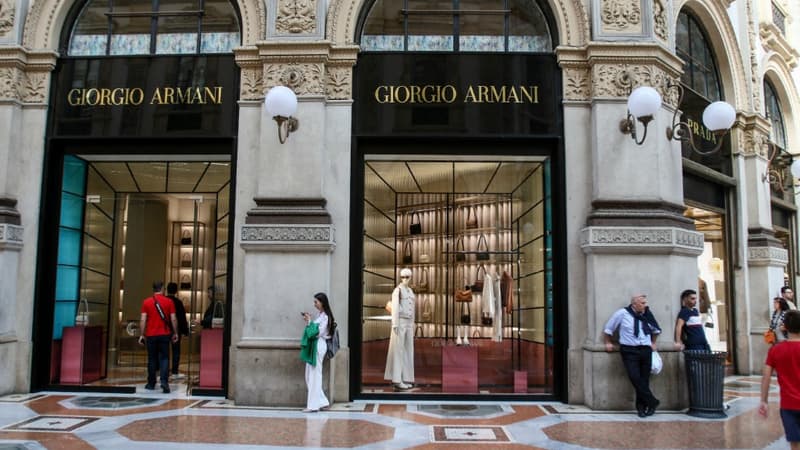Luxury cajza, 3,000 or 4,000 euros bags … and clandestine workshops. Italy, world luxury land, hides a much less bright side: that of unnoticed, undocumented workers, sometimes locked in the workshops to produce at low cost. The matter of the Piana de Loro is no exception, but the illustration of an opaque system, which operates behind the transalpine luxury scene.
Placed under the judicial administration in mid -July by a court in Milan, the claw of Piana de Loro, Italian badge of the Kashmir in the hands of LVMH, was caught in the disorders of its subcontracting. In question: a waterfall production chain, with invisible links, where Chinese workers in an irregular situation worked in illegal and poorly paid conditions, sometimes directly housed in the workshops. The workers were paid approximately 4 euros per hour and were forced to extreme schedules (up to 90 hours per week). The Court indicates a “guilty negligence” by the brand, and an internal audit is considered failure.
Contacted by Fashion United, Loro Piana specifies that the supplier in question did not comply with its “legal and contractual obligations.” Loro Piana said in his press release that “he constantly reviewed and would continue to strengthen his control and audit activities” to guarantee the fulfillment of his own quality and ethical standards throughout the supply chain. An emblematic case of a broader system, denounced by Milanese prosecutors, where the gain of the low -cost career upside down of luxury Made in Italy.
A fragmented ecosystem conducive to abuse
According to the Bain consulting firm, Italy houses between 50% and 55% of the world production of luxury products. A productive fabric that is largely based on thousands of SMEs and small workshops, concentrated in the regions of Milan, Florence or Prato. It is this explosion organization that hinders controls and referrals.
In fact, Italian luxury production is based on a tangle of microenterprises, independent and subcontractor suppliers at several levels, often located in discrete industrial areas around Milan, Prato or Naples.
In this dense network, the Great Houses rarely work live with the final manufacturers. The orders go hand in hand, from a client to a workshop, then another, sometimes to a fourth or fifth subcontractor. A fragmentation that makes monitoring almost impossible, even for brands related to compliance.
Each link can outsource part of the production without informing its direct customers. Traditional audit controls: often planned, sometimes superficial, fight to detect real abuses: clandestine workshops, unworthy working conditions, misery salaries or non -successful employees, often of foreign origin. An economic model, both profitable and fragile, whose ethical limits are exposed today by repeated judicial investigations.
“Maintenance available 24 hours a day”
In 2024-2025, several large luxury houses such as Dior, Armani and Valentino, were set by Italian justice by alarming practices in their sub-transit chain.
The competence authority explains these controls for “a possible illicit behavior in the promotion and sale of clothing items and accessories, in violation of the Italian consumption code.” Although no crime for Dior has been observed, the French luxury house will still have to pay 2 million euros for five years to support initiatives aimed at helping operational victims for work.
On the side of Valentino, his subsidiary Valentino Bags Lab was placed under the judicial administration after the discovery of clandestine workshops around Milan, where workers slept in their workplace, without contract, with dangerous security conditions.
In the case of Valentino Bags Lab, the surveys conducted in the Milan region in 2024 and 2025 revealed a well -established operating system: some workshops were executed continuously, day and night, even during the holidays, to have a “workforce available 24 hours a day,” according to the court’s trial. The workers, forced to sleep in their workplace, faced infernal rates, without rest or security guarantee. To gain productivity, machines protection devices were often dismantled, challenging health rules.
Another emblematic example of the ruling opacity broke out on Friday, August 1 in Italy: the Luxe Armani Group was sentenced to a fine of 3.5 million euros for deceptive advertising on working conditions in its subcontractors. The Italian competition authority, which conducted an investigation for a year, criticized Giorgio Armani Spa and Giorgio Armani (GAO) operations to formulate the ethical and social responsibility “not corresponding to reality.” In fact, the brand’s site, Armanivalues.com, emphasizing the commitment to employee’s well -being and work security defended by Armani was pointed out as a simple marketing tool aimed at seducing customers. In fact, according to the authority, Armani worked with subcontractors who requested other suppliers, where health and safety conditions were “unacceptable“. Armani announced in a statement that he will resort to this fine, expressing “his disappointment and his bitterness.”
Given the magnitude of the drift, the Italian Industry Minister, Adolfo Urso, begged for a prior certification system for the legality and sustainability of suppliers, to avoid the illegal actions of a link to attach a complete industry, symbolically linked to the “facts in Italy”.
At the same time, in May 2025, the authorities, fashion federations and unions signed an action plan, involving the sector to strengthen controls and eradicate operations in production chains.
If Italy is the European luxury factory, it is also the one facing tensions between artisanal excellence and low -cost profits. The Loro Piana case, far from being isolated, sounds like an alarm signal: consumer confidence, the sector’s reputation and the legitimacy of “done in Italy” are now based on transparency finally assumed.
Source: BFM TV


